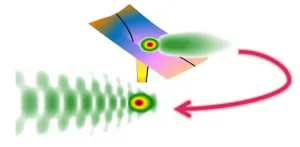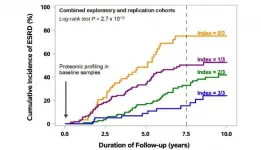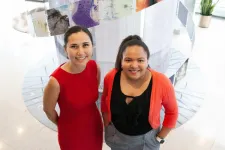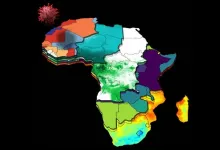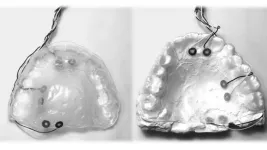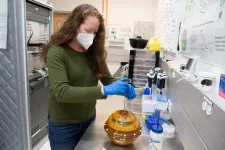INFORMATION:
Read the open access article by Jia Tan et al., "Resolving and weighing the quantum orbits in strong-field tunneling ionization," Adv. Photonics 3(3), 035001 (2021), doi 10.1117/1.AP.3.3.035001.
Decoding electron dynamics
A new method for identifying quantum orbits enables photoelectron spectroscopy via tunneling ionization to provide attosecond temporal and subangstrom spatial resolution measurement of electron dynamics
2021-06-30
(Press-News.org) Electron motion in atoms and molecules is of fundamental importance to many physical, biological, and chemical processes. Exploring electron dynamics within atoms and molecules is essential for understanding and manipulating these phenomena. Pump-probe spectroscopy is the conventional technique. The 1999 Nobel Prize in Chemistry provides a well-known example wherein femtosecond pumped laser pulses served to probe the atomic motion involved in chemical reactions. However, because the timescale of electron motion within atoms and molecules is on the order of attoseconds (10-18 seconds) rather than femtoseconds (10-15 seconds), attosecond pulses are required to probe electron motion. With the development of the attosecond technology, lasers with pulse durations shorter than 100 attoseconds have become available, providing opportunities for probing and manipulating electron dynamics in atoms and molecules.
Another important method for probing electron dynamics is based on strong-field tunneling ionization. In this method, a strong femtosecond laser is employed to induce tunneling ionization, a quantum mechanical phenomenon that causes electrons to tunnel through the potential barrier and escape from the atom or molecule. This process provides photoelectron-encoded information about ultrafast electron dynamics. Based on the relationship between the ionization time and the final momentum of the tunneling ionized photoelectron, electron dynamics can be observed with attosecond-scale resolution.
The relationship between ionization time and the final momentum of the tunneling photoelectron has been theoretically established in terms of a "quantum orbit" model and the accuracy of the relationship has been verified experimentally. But which quantum orbits contribute to the photoelectron yield in strong-field tunneling ionization has remained a mystery, as well as how different orbits correspond differently to momentum and ionization times. So, identifying the quantum orbits is vital to the study of ultrafast dynamic processes using tunneling ionization.
As reported in Advanced Photonics, researchers at Huazhong University of Science and Technology (HUST) proposed a scheme to identify and weigh the quantum orbits in strong-field tunneling ionization. In their scheme, a second harmonic (SH) frequency is introduced to perturb the tunneling ionization process. The perturbation SH is much weaker than the fundamental field, so it does not change the final momentum of the electron that is tunneling toward ionization. However, it can significantly alter the photoelectron yield, due to the highly nonlinear nature of tunneling ionization. Because of different ionization times, different quantum orbitals have different responses to the intervening SH field. By changing the phase of the SH field relative to the fundamental driving field and monitoring the responses of the photoelectron yield, the quantum orbits of tunneling ionized electrons can be accurately identified. Based on this scheme, the mysteries of the so-called "long" and "short" quantum orbits in strong-field tunneling ionization can be resolved, and their relative contribution to the photoelectron yield at each momentum is able to be accurately weighted. This is a very important development for the application of strong-field tunneling ionization as a method of photoelectron spectroscopy.
A collaborative team effort led by HUST graduate students Jia Tan, under the supervision of Professor Yueming Zhou, along with Shengliang Xu and Xu Han, under the supervision of Professor Qingbin Zhang, the study indicates that the hologram generated by the multi-orbit contribution from the photoelectronic spectrum can provide valuable information regarding the phase of the tunneled electron. Its wave packet encodes rich information about atomic and molecular electron dynamics. According to Peixiang Lu, HUST professor, vice director of the Wuhan National Laboratory for Optoelectronics, and senior author of the study, "Attosecond temporal and subangstrom spatial resolution measurement of electron dynamics is made possible by this new scheme for resolving and weighing quantum orbits."
ELSE PRESS RELEASES FROM THIS DATE:
Assessment tool helps future pharmacists prepare for work in the community
2021-06-30
A recent University of Arizona College of Pharmacy study suggests that Objective Structured Clinical Examinations (OSCEs) may be a valuable means of assesing clinical skills while providing learning experiences for pharmacy students in community pharmacy settings. While the OSCEs were designed to assess health care professionals in a clinical setting, there was limited data on its use in testing skills required in community pharmacies, until now.
For pharmacists working in retail, guiding patients on the use of over-the-counter (OTC) drugs is a common part of the job. According to a recent survey from the American ...
Keep your friends close, cortisol levels low for life
2021-06-30
Directing a meeting, dialing up an old acquaintance, dictating the perfect tuna salad sandwich across a drive-through window. For business and for pleasure, human beings are in constant communication.Our proclivity for socialization is lifelong, equally prominent in the lives of adolescents and adults. A recent study determined key differences in the ways that various age groups communicate, as well as one conversational component that stands the test of time: friendship. Specifically, bonds between individuals who identify as female.
Led by former Beckman Institute postdoctoral researchers Michelle Rodrigues and Si On Yoon, an interdisciplinary team evaluated how interlocutors' age and familiarity with one another impacts a conversation, reviewing the interaction's ...
Newly discovered proteins protect against progression of diabetic kidney disease
2021-06-30
Elevated levels of three specific circulating proteins are associated with protection against kidney failure in diabetes, according to research from the Joslin Diabetes Center that will be published 30th June in Science Translational Medicine.
"As well as acting as biomarkers for advancing kidney disease risk in diabetes, the proteins may also serve as the basis for future therapies against progression to the most serious types of kidney disease," said Andrzej S. Krolewski MD, PhD, senior author on the publication, senior investigator at Joslin Diabetes Center and professor of medicine ...
Proteins could offer risk markers and therapy targets in diabetic kidney disease
2021-06-30
A 7- to 15-year longitudinal study of 358 diabetics has linked 3 proteins in blood with a slower progression of diabetic kidney disease and progressive kidney failure. The results from Zaipul Md Dom and colleagues suggest that the proteins could help researchers identify diabetics most at risk of kidney damage, potentially enabling earlier interventions and treatment. Despite advancements in blood sugar control and kidney therapies, patients with type 1 or type 2 diabetes still face a high risk of diabetic kidney disease. This condition can eventually progress to end-stage kidney disease, but some patients show slower kidney decline than others. In recent ...
AI and marshmallows: Training human-AI collaboration
2021-06-30
Despite unprecedented advancements in technology and countless depictions of complex human-AI interactions in sci-fi movies, we have yet to fully achieve AI bots that can engage in conversation as naturally as humans can. Kushal Chawla, researcher at the USC Institute for Creative Technologies (ICT) and a doctoral student in computer science, along with collaborators at both the USC Information Sciences Institute (ISI) and ICT are taking us one step closer to this reality by teaching AI how to negotiate with humans.
The research, presented at the 2021 Annual Conference of ...
New markers for coronary microvascular disease identified
2021-06-30
Although cardiovascular disease is the main cause of illness among women in the U.S., certain conditions such as coronary microvascular disease (CMD) cannot be easily diagnosed. In a new study, researchers at the University of Illinois Urbana-Champaign have identified specific biomarkers for CMD, which might reduce future hospitalizations.
CMD damages the inner walls of blood vessels causing spasms and decreased blood flow to the heart muscle. "Clinicians look for plaque formation in the blood vessels, which does not occur in CMD," said Zeynep Madak-Erdogan (CGD/EIRH/GSP), an associate professor of nutrition. "Usually, ...
International team develops predictive tool to help mitigate COVID-19 in Africa
2021-06-30
The virus that gives rise to COVID-19 is the third coronavirus to threaten humanity in the past two decades. It also happens to move more efficiently from person to person than either SARS or MERS did. The first African case of COVID-19 was diagnosed in Egypt in mid-February of 2020. Four weeks later, the first lockdowns began across Africa. Steven Schiff, Brush Chair Professor of Engineering at Penn State, who already had established research partnerships in Uganda, saw an opportunity for his team to apply what they were learning from their ongoing efforts to track and control infectious disease and ...
Conservation aquaculture could bring more native oysters to west coast
2021-06-30
Ten estuaries on the West Coast of North America have been identified as priority locations for expanding the use of conservation aquaculture in a study led by the Native Olympia Oyster Collaborative and funded by the Science for Nature and People Partnership (SNAPP). SNAPP is a research collaboration supported by the National Center for Ecological Analysis & Synthesis (NCEAS) at UC Santa Barbara.
The study, published in Plos One, recommends locations and methods for the strategic expansion of conservation aquaculture to bring back Olympia oyster populations -- both to local estuaries where they have most declined, and into more local restaurants for oyster lovers to dine on. The authors propose using aquaculture in these estuaries -- ...
Research lays groundwork for restoring lost oral functions with pacemaker-like devices
2021-06-30
Even the mundane act of swallowing requires a well-coordinated dance of more than 30 muscles of the mouth. The loss of function of even one of these, due to disease or injury, can be extremely debilitating. For these people, nerve stimulation offers a ray of hope to regain some of their lost oral function.
In a new study, researchers at Texas A&M University have delineated the minimum size of electrical currents needed to provide sensation in different parts of the mouth. The researchers said their study is a first but vital step toward building electrical stimulation implants that can restore essential intraoral functions that are lost due to nerve or brain damage.
The results of the study are published in the journal ...
NIST-led study finds variations in quantitative MRI scanners' measurements
2021-06-30
Magnetic resonance imaging (MRI) is widely used in medicine to detect, diagnose and treat diseases such as cancer, while relying on experts' interpretation of images. Quantitative MRI, which obtains numerical measurements during the scans, can now potentially offer greater accuracy, repeatability and speed -- but rigorous quality control is needed for it to reach its full potential, according to a new study.
Researchers at the National Institute of Standards and Technology (NIST) led the study by 11 institutions comparing measurements by 27 MRI scanners from three vendors at nine clinical sites around the country. To obtain reference values and disentangle sources of bias and variation, the study used a tissue stand-in, or "phantom," originally ...
LAST 30 PRESS RELEASES:
Bacteria frozen in ancient underground ice cave found to be resistant against 10 modern antibiotics
Rhododendron-derived drugs now made by bacteria
Admissions for child maltreatment decreased during first phase of COVID-19 pandemic, but ICU admissions increased later
Power in motion: transforming energy harvesting with gyroscopes
Ketamine high NOT related to treatment success for people with alcohol problems, study finds
1 in 6 Medicare beneficiaries depend on telehealth for key medical care
Maps can encourage home radon testing in the right settings
Exploring the link between hearing loss and cognitive decline
Machine learning tool can predict serious transplant complications months earlier
Prevalence of over-the-counter and prescription medication use in the US
US child mental health care need, unmet needs, and difficulty accessing services
Incidental rotator cuff abnormalities on magnetic resonance imaging
Sensing local fibers in pancreatic tumors, cancer cells ‘choose’ to either grow or tolerate treatment
Barriers to mental health care leave many children behind, new data cautions
Cancer and inflammation: immunologic interplay, translational advances, and clinical strategies
Bioactive polyphenolic compounds and in vitro anti-degenerative property-based pharmacological propensities of some promising germplasms of Amaranthus hypochondriacus L.
AI-powered companionship: PolyU interfaculty scholar harnesses music and empathetic speech in robots to combat loneliness
Antarctica sits above Earth’s strongest “gravity hole.” Now we know how it got that way
Haircare products made with botanicals protects strands, adds shine
Enhanced pulmonary nodule detection and classification using artificial intelligence on LIDC-IDRI data
Using NBA, study finds that pay differences among top performers can erode cooperation
Korea University, Stanford University, and IESGA launch Water Sustainability Index to combat ESG greenwashing
Molecular glue discovery: large scale instead of lucky strike
Insulin resistance predictor highlights cancer connection
Explaining next-generation solar cells
Slippery ions create a smoother path to blue energy
Magnetic resonance imaging opens the door to better treatments for underdiagnosed atypical Parkinsonisms
National poll finds gaps in community preparedness for teen cardiac emergencies
One strategy to block both drug-resistant bacteria and influenza: new broad-spectrum infection prevention approach validated
Survey: 3 in 4 skip physical therapy homework, stunting progress
[Press-News.org] Decoding electron dynamicsA new method for identifying quantum orbits enables photoelectron spectroscopy via tunneling ionization to provide attosecond temporal and subangstrom spatial resolution measurement of electron dynamics
